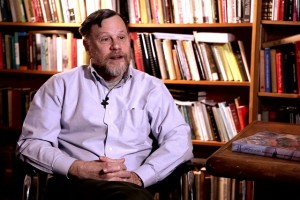Structure and Character of the Internet
Computer scientist David Clark on security issues, the idea behind information-centric networking, and the inf...
The initial question is – why call something digital anthropology in the first place? People probably wouldn’t associate the discipline of anthropology with the studies of the digital, but if you think about it, anthropology was always a subject dedicated to the study of peoples around the world and whatever the peoples around the world do. Therefore, we want to be studying it. For us, in a way, it’s a fairly obvious advance that we simply acknowledge that there have been developments in the digital field in so many different ways. I’m going to be talking particularly about work on social media and digital communications, but in our program on digital anthropology we also have courses on, for example, data, or infrastructure, or the digitization of museum archives. It’s hard to think of anything that isn’t actually affected by the process of digitization.
For us, it’s a natural progression anthropology, we follow what happens in the world, if the world goes digital, we go digital. But I do think there’s an additional point here, because in contemporary anthropology we’re also in some ways arguing against certain, I think, quite old assumptions, if you like, stereotypes about my discipline as a whole. Because originally anthropology was associated with the study of tribal groups and ethnic groups differentiated from sociology, which was seen as more the study of kind of urban societies. Actually, that’s a very old image of anthropology. Today we would say that we just study societies whoever they may be, wherever they may be. A lot of my previous projects have been, for example, in London and/or Trinidad, not particularly the kind of places that were associated with that very kind of original form of anthropology.
So, calling a program Digital Anthropology is, perhaps, quite a forceful way of making this precise point, because people associate digital with everything that’s kind of rapidly changing, nothing that’s at all kind of traditional or conservative. The idea that anthropology is now going to have a specialist arena concentrating on this area is a challenge. One of the main things we really want to do now is demonstrate why anthropology is in some ways, we would say actually, the very best way, of understanding the digital inasmuch as when we talk about the study of the digital clearly we’ve got to be interested in the consequences it has on people. That’s really why this is the right domain for anthropology, because we don’t have to study the technology or even understand the technology, but we really do have to understand the consequences all these changes have on populations. We believe that in order to do that you need the kind of approaches that we represent.
I guess, one of the reasons for that is that anthropology has always been interested in the way people socialize, sort of networking together. In fact, when I started they were even called “social media” they were called “social networking sites”, which is a bit kind of the way anthropologists think about people. Because psychologists would study people as individuals. We study people as kind of social networking sites and we think of kinship. That’s why we wanted to have a program that looked particularly at social media. And the other reason was that you recognize that social media is something that has got a huge presence, that the newspapers every day make quite strange claims about the consequences of social media. They tell you: “oh, young people today, they don’t have a proper attention span, and it’s because of social media” or “young people today, they don’t really understand the meaning of a proper friend, and that’s because of social media”. We felt that as anthropologists there has been a responsibility, somebody needs to go out there and do a different kind of scholarship to actually establish what are the genuine consequences of the developments of these social media.
In doing that we didn’t want to compromise the way that we traditionally study. Although we’re studying very new phenomena, we’re using a method that has been established for a very long time. I was fortunate in terms of funding from the European Research Council and elsewhere to be able to assemble a team of nine people, nine anthropologists, and we were all committed to spending 15 months each in sights all around the world. Very briefly, we tended to focus on low-income sites, but we had one in northern Chile, one in Brazil, one in Trinidad. I worked in some villages north of London, we had one in the south of Italy, we have one in the deep south of India and we actually had two in China. One is a fairly sort of traditional rural site, but the contrast was to have somebody in one of these factories. There’s been this rapid kind of change in China with 250 million people are moving into the factory system. So, in this case the anthropologist simply lived inside one of these factories for 15 months to study the factory population.
Anthropology, at least, ideally, would like to be a comparative discipline. The point for us was that we were very collaborative, every month we all agreed to focus on the same topic, we compared what we were finding. This is actually very important, because it gives you a sense of kind of what happens. The end of a month the person in Brazil says: “oh, well, I’m trying to understand, you know, why people post what they post on Facebook, and I see that these people, you know, they have low income, so they’re not going to post against the horrible houses, half-built brickwork that they actually live in. Of course, they’re going to post again by the gym, by the swimming pool, something that shows their aspirations in life”. And the person from Chile turns around and says: “But what are you talking about? I work in a low income place, and here people actually are trying to forge a community around who they are, but everybody knows each other very well. So everybody knows what’s truthful about a person. You couldn’t claim that you were going through gym when everyone knows you can’t afford to go to the gym. The whole point is that everybody when posting on social media has to be honest and unpretentious and not show these kind of aspirations. But just you know recognize humbly who they actually are and create the solidarity of community”. So, when that happens the person in Brazil says: “Oh, okay, maybe what I said wasn’t so straightforward. There must be reason why Brazil is not like Chile. I now have responsibility for looking more closely at specific conditions of my Brazilian sights. You look at your Chilean sight and let’s work out why you have these differences”.
I think, the most important result of our project after the 15 months research was simply to say that actually there are incredible differences between these nine sights with regard to almost any topic you like. To give the one the journalist always kind of asked me about, they say: “Oh, well, you know everybody now takes selfies”, which a) means, they think, that they’re selfish, young people are narcissistic; and b) they think “well, that’s a global homogenization, because everyone is taking selfies”. First point I make is “no”. Actually in the schools, for example what I worked in Britain, five times as many people post selfies, where they put their arm around their friends to show they’re all good friends together, not individualistic. So that notion of selfie as selfish doesn’t work. And secondly, they post for very different reasons. In our Italian sight, they actually try to be stylish in an Italian way. They asked the hairdresser what is the right Italian style to have before I make my selfie, whereas in Trinidad they are incredibly individualistic, you would never want to pose a selfie that looks like somebody else.
In the end of this, we produced a lot of material. We have our own definition of social media. We call it “a scalable sociality”, which means that now you’ve gone from having the gulf between public broadcasting and private communication. Broadcasting has some gone down to smaller sites, where you broadcast to 300 people. Whereas things like messenger services has moved up or things like Telegram and WhatsApp to bigger groups. Now, in a sense, you just have a range of groups, you can scale your sociality, you could have more private, less private, bigger groups, smaller groups, and this is a big change. Many big changes. The way, for example, that as well as all written communication, we now have a visual, things like Snapchat where you send images of your face all day long, but it’s like a conversation. So, a new kind of visual communication is out there.
But in terms of the impact – politics, education, etc. – a lot of simplistic things said. Usually we find that social media exacerbates things that were there before. It’s both bad for education (you know, a distraction), good for education (you can find a lot of stuff out). Problems for political radicals, because they can be identified by the state. Good for political radicals, because they can get together and use social media. So the simple statements made are too far simplistic. Obviously, a lot of material. The one thing I can probably end on is by saying: we are very committed to open access dissemination and making things very clear. We have 11 books coming out all under open access with University College London Press. We have a free five-week e-learning course, which, I’m delighted to say, is being translated into Russian and will soon be available in Russian. We have a website called “Why we post”, and all our material is translated already into all the languages of all the places where we did fieldwork. It’s wonderful to get volunteers in places like Russia who are actually doing the translation themselves.
Next, I’m getting ready to move on to a set of new questions. In the next project, for the next five years we’re moving to the more general ethnography of the smartphone, we’re interested in particular in the development of health applications, mobile health apps. We want to see this time whether anthropology can actually be useful in really improving the welfare and health of populations by making these kind of new technologies more culturally and socially sensitive, because of the information we’ve gained through carrying out these long-term ethnographies. That is the next stage in my particular part of digital anthropology.

Computer scientist David Clark on security issues, the idea behind information-centric networking, and the inf...

Professor Colin Sparks on decline in media, digitalization of information and top-ten Google searches

Historian Thomas Barfield on the Xiongnu empire, Genghis Khan, and the Mongolian tax policy